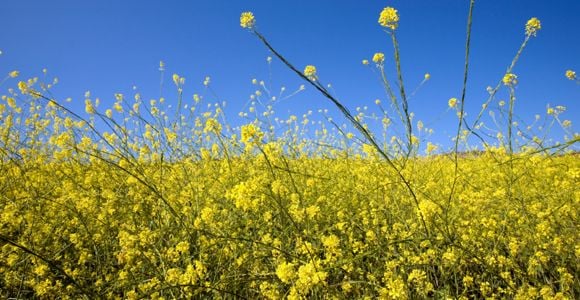There's something in the air...and it's giving you hay fever. It could be pollen, dust, cigarette smoke, air pollutants, or a combination of many things. Whatever your particular cocktail may be, it can cause symptoms that run from annoying to absolutely debilitating.
But what if a change in diet could help alleviate, or potentially even avoid, hay fever?
Hay fever is the result of the immune system launching an offensive against an allergen. It's the immune system gone haywire. And if you're worn down, the immune system is easily thrown off. You get colds because you can't fight off the bad bugs; you get hay fever because your body overreacts to harmless substances. If you're supporting your body's defenses, they're less likely to go wrong. Here are five nutrients that can help support those defenses:
1. Water
Dry eyes and nasal passages are perfect places for inflammation to happen. If you're hydrated, the mucus membranes can better do their job of stopping allergens before they get into your system. Get at least a liter of water a day, and make the rest of your fluids caffeine and alcohol free.
2. Antioxidants
One important way to support the immune system is to get plenty of antioxidants like lycopene, beta-carotene, lutein, vitamin C, and selenium. Antioxidants work with the immune system as it scavenges for intruders. Kale and other leafy greens, broccoli, sweet potatoes, and citrus fruit are excellent sources of antioxidants.
3. Vitamin E
Shown to reduce the sensitization to allergens by suppressing the immune cells that cause allergic symptoms, vitamin E plays a unique role in helping with hay fever. Another antioxidant, sources of vitamin E include avocados, olives and olive oil, leafy greens, and nuts. An ounce of almonds meets half your daily recommended intake for Vitamin E!
4. Zinc
An important key in regulating the immune system, some studies have linked zinc deficiency and nasal allergies. Red meat, poultry, dark meat, and oysters are excellent sources of zinc. The zinc found in plant foods, however, may be bound to phytates, making it more difficult to absorb. Vegetarians will need to eat more nuts, cereal grains, and legumes to get the zinc they need.
5. Fish Oil
The omega-3 fatty acids DHA and EPA, found in fish, are anti-inflammatory. The western diet is high in the pro-inflammatory fatty acids found in vegetable oils and animal fats. Since hay fever is an inflammatory reaction, DHA and EPA can help to balance your body's immune system and decrease allergic reactions. The best sources of these omega-3's are fatty fish such as salmon, herring, and sardines. Two servings of fish per week or about 2 grams of fish oil, if you prefer the supplement, has been recommended by the Harvard School of Public Health.
Jennifer Webb, MS, RD, CNSC is a practicing dietitian and freelance writer based out of Southern California. She has been practicing medical nutrition therapy for the past five years. Prior to her career in nutrition, she received a degree in early childhood development. She has combined her two passions, nutrition and family, into a career educating people about the impact food can have on health across the lifespan. She is currently a dietitian at a top children's hospital and runs a private practice. Her private practice specializes in family nutrition therapy, a technique that focuses on changing family habits to lead them to lifelong healthy lifestyles. Contact Jennifer at [email protected].



